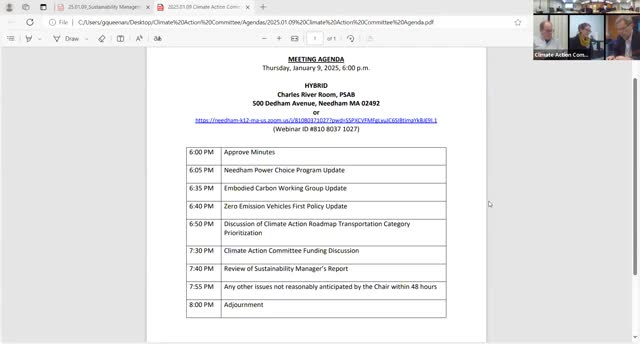Needham committee prioritizes fleet electrification and public charging information in transportation roadmap
Get AI-powered insights, summaries, and transcripts
Subscribe
Summary
Committee reviewed transportation roadmap priorities, discussed the town's newly adopted zero‑emissions‑first vehicle policy for schools and the fleet electrification roadmap, and flagged public charging, apartment access and bus electrification costs and funding as near‑term work areas.
The Climate Action Committee on Jan. 9 discussed transportation priorities for 2025, including fleet electrification, public charging infrastructure, multi‑family access to chargers and the cost and timing of electric buses.
Nut graf: Committee members grouped transportation actions into a high‑priority top five that includes public education/incentives for EV adoption, municipal fleet electrification and addressing charger access for apartments. Staff said the town’s fleet electrification roadmap includes metrics for municipal chargers through 2050 and that bus electrification will require coordination on charger compatibility and likely substantial capital funding.
Committee staff said the School Committee adopted a “zero‑emissions‑first” vehicles policy on Dec. 17, identical to a select board policy adopted in late November; the policy is one eligibility requirement for applying to be a Climate Leadership Community. Committee members asked whether the town’s finance committee and capital planners are aware of procurement implications; a finance committee member said detailed cost/benefit analysis will be needed when specific fleet replacements enter the capital plan.
Gabby, a town staff member, said the fleet electrification roadmap covers light, medium and heavy duty vehicles from the present through 2050 and includes an assumed market evolution for heavy‑duty electrification. That roadmap produced charger‑count estimates for municipal fleet needs; Gabby said staff will extract near‑term (5–10 year) benchmarks for chargers to include in performance indicators.
Committee members discussed public charging strategy. Several members said the town should focus short‑term on municipal chargers to support town vehicles and on lowering barriers for private and multifamily installations rather than paying to install many public chargers itself. Panelists noted Eversource’s make‑ready incentive program had paused or reduced enrollment because demand overwhelmed funding; staff said the town will pursue available state and federal funding when possible.
On buses, staff said the schools have proposed $375,000 in FY26 for one electric bus. Gabby said electric‑bus prices she has seen range roughly $350,000–$450,000; the transcript record shows a school request of $375,000 for FY26. Gabby also said some federal and state rebate programs are available: the clean‑school‑bus rebate (eligibility up to $170,000 for Needham under current rules) and a federal elective pay provision the town cited as offering “$40,000 back” for heavier vehicles; staff noted the school rebate operates by lottery and is not guaranteed.
Nut closing: Committee members asked staff to refine the transportation roadmap with measurable near‑term goals, to investigate zoning or process barriers to private charging at apartments, and to pursue grant opportunities for municipal chargers and buses.
Ending: Staff will add charger benchmarks and further detail to the roadmap and return with a prioritized set of subactions for the committee to review.
